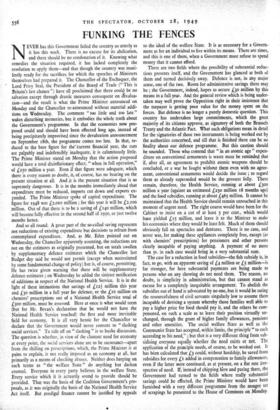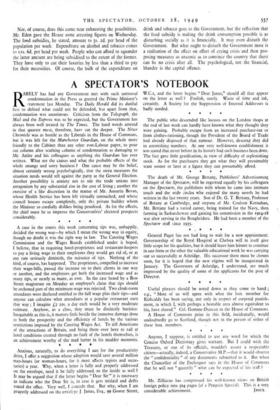FUNKING THE FENCES
NEVER has this Government failed the country so utterly as it has this week. There is no excuse for its abdication, and there should be no condonation of it. Knowing what remedies the situation required, it has lacked completely the resolution to apply them—and that though the country was mani- festly ready for the sacrifices for which the speeches of Ministers themselves had prepared it. The Chancellor of the Exchequer, the Lord Privy Seal, the President of the Board of Trade (" This is Britain's last chance ") have all proclaimed that there could be no salvation except through drastic measures consequent on devalua- tion—and the result is what the Prime Minister announced on Monday and the Chancellor re-announced without material addi- tions on Wednesday. The comment " too little and too late " wakes disturbing memories, but it embodies the whole truth about the Government's programme. In that the economies now pro- posed could and should have been effected long ago, instead of being precipitately improvised since the devaluation announcement on September r8th, the programme comes too late. In that, re- duced to the bare figure for the current financial year, the cuts are palpably and indefensibly inadequate, it is calamitously little. The Prime Minister stated on Monday that the action proposed would have a total disinfiationary effect. " when in full operation," of £250 million a year. Even if that figure were adequate, which there is every reason to doubt, it, of course, has no bearing on the present situation at all. And it is the present situation that is so supremely dangerous. It is in the months immediately ahead that expenditure must be reduced, imports cut down and exports ex- panded. The Prime Minister spoke of capital expenditure. The figure for 1948 was £2,000 million ; for this year it will be £2,100 million. Out of that there is to be a saving of £140 million, which will become fully effective in the second half of 195o, or just twelve months hence.
And so all round. A great part of the so-called saving represents not reductions of existing expenditure but decisions to refrain from contemplated expenditure. And, as Mr. Eden pointed out on Wednesday, the Chancellor apparently assenting, the reductions are not on the estimates as originally presented, but on totals swollen by supplementary defence estimates which the Chancellor last Budget day said he would not permit (except when necessitated by some fundamental change of policy) but is, of course, permitting.
He has twice given warning that there will be supplementary defence estimates ; on Wednesday he added the sinister notification of additions in respect of the National Health Service. It is in the light of these intimations that savings of LI21 million this year and £30 million in a full year for defence, or the LH) million on chemists' prescriptions out of a National Health Service total of £3oo million, must be assessed. Here at once is what would seem (but for Mr. Bevan's declaration that he would not have the National Health Service touched) the first and most inevitable field for economy. It is all very heroic for the Chancellor to declare that the Government would never consent to " slashing social services." To ride off on " slashing " is to burke discussion.
The question is whether, in view of the clamant need for economy at every point, the social services alone are to be sacrosanct—apart from the shilling on prescriptions, which, the Prime Minister is at pains to explain, is not really imposed as an economy at all, but primarily as a means of checking abuses. Neither does harping on such terms as " the welfare State " do anything but darken counsel. Everyone in every party believes in the welfare State. Every service which it is actuarily sound to provide should be provided. That was the basis of the Coalition Government's pro- posals, as it was originally the basis of the National Health Service Act itself. But prodigal finance cannot be justified by appeals to the ideal of the welfare State. It is as necessary for a Govern- ment as for an individual to live within its means. There are times, and this is one of them, when a Government must refuse to spend money that it cannot afford.
There are two fields where the possibility of substantial reduc- tions presents itself, and the Government has glanced at both of them and turned decisively away. Defence is not, in any major sense, one of the two. Room for administrative savings there may be ; the Government, indeed, hopes to secure £30 million by this means in a full year. And the general review which is being under- taken may well prove the Opposition right in their insistence that the taxpayer is getting poor value for the money spent on the forces. But defence is no longer a purely domestic question. This country has undertaken large commitments, which the great majority of its citizens approve, as signatory of both the Brussels Treaty and the Atlantic Pact. What such obligations mean in detail for the signatories of those two instruments is being worked out by the authorities concerned, and till that is finished there can be no finality about our defence programme. But this caution should be sounded. Those who contend that " in an atomic age " expen- diture on conventional armaments is waste must be reminded that if, after all, an agreement to prohibit atomic weapons should be concluded, or a war be fought without them even with no agree- ment, conventional armaments would decide the issue ; to regard them as already superseded would be the grossest folly. There remain, therefore, the Health Service, running at about £300 million a year (against an estimated £230 million 18 months ago) and the food subsidies, running at about £465 million. It cannot be maintained that the Health Service should remain untouched in this moment of urgent need. The right course would have been for the Cabinet to insist on a cut of at least 5 per cent., which would have yielded £15 million, and leave it to the Minister to make his economies where they would be least felt. Much of them should obviously fall on spectacles and dentures. There is no case, and never was, for making these appliances completely free, except (as with chemists' prescriptions) for pensioners and other persons clearly incapable of paying anything. A payment of no more than 5s. in each case would bring in a very substantial sum.
The case for a reduction in food subsidies—the fish subsidy is, in fact, to go, with an apparent saving of £4 million or £5 million—is far stronger, for here substantial payments are being made to persons who on any showing do not need them. The reason, no doubt, is simplicity in administration, but that cannot stand as excuse for a completely inequitable arrangement. To abolish the subsidies out of hand is advocated by no one, but it would be rating the resourcefulness of civil servants singularly low to assume them incapable of devising a system whereby those families well able to pay a higher price for food should pay it, and the others be com- pensated, on such a scale as to leave their position virtually un- changed, through the grant of higher family allowances, pensions and other amenities. The social welfare State as well as the Communist State has accepted, within limits, the principle " to each according to his need," ; but that is a very different thing from sub- sidising everyone equally whether the need exists or not. The application of the principle needs, of course, to be worked out. It has been calculated that £3 could, without hardship, be saved from subsidies for every LI added in compensation to family allowances, even if the latter were continued, as at present, on a flat rate irre- spective of need. If, instead of chipping here and paring there, the Government had turned to the fields where really substantial savings could be effected, the Prime Minister would have been furnished with a very different programme from the meagre set of scrapings he presented to the House of Commons on Monday. Nor, of course, does this come near exhausting the possibilities. Mr. Eden gave the House some arresting figures on Wednesday. The food subsidies, he stated, amount to 3s. 2d. per head of the population per week. Expenditure on alcohol and tobacco comes to its. 6d. per head per week. People who can afford to squander the latter amount are being subsidised to the extent of the former. They have only to cut their luxuries by less than a third to pay for their necessities. Of course, the bulk of the expenditure on drink and tobacco goes to the Government, but the reflection that the food subsidy is making the drink consumption possible is as disturbing socially as it is financially. It may even disturb the Government. But what ought to disturb the Government most is a realisation of the effect on effort of crying crisis and then pro- posing measures so anaemic as to convince the country that there can be no crisis after all. The psychological, not the financial, blunder is the capital offence.







































 Previous page
Previous page